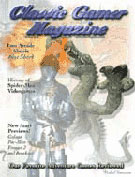Did
you ever wish Atari made a sequel to their hit game
"Adventure"? Well, you're in luck because
they did. Sort of. "Adventure II," as
it was originally known, was intended to be similar
to the earlier Adventure, only much
grander in scale. In fact, the project became so enormous,
they decided to break it up into four separate games.
These games came to be known collectively as the "SwordQuest"
series.
Each
game would take the theme and name of its elemental
counterpart: Earthworld, Fireworld,
Waterworld, and Airworld.
To sweeten the deal, Atari promoted a national contest
to award valuable prizes to contestants who could
solve each of the games by deciphering a series of
clues. The clues would be found in comic books included
with the games.
The
winners from each competition would receive the following
prizes valued at $25,000 each:
Earthworld:
An 18kt solid gold Talisman with twelve diamonds and
twelve other precious stones representing the signs
of the Zodiac.
Fireworld:
A platinum and gold Chalice decorated with jewels
such as pearls, rubies, and sapphires.
Waterworld:
A gold Crown trimmed with valuable gems.
Airworld:
The Philosopher's Stone, which was a large piece of
white jade encased in a jewel encrusted 18kt gold
box.
The
winners from each contest would then compete to win
the ultimate prize: a jewel-encrusted Sword with an
18kt gold handle, silver blade covered with emeralds,
rubies, sapphires, and diamonds (no green clovers,
though!).
If
you wanted to get your hands on some of this loot,
all you had to do was purchase the games, play them,
and hopefully solve them with the help of the comic
books. At that point you would mail your solution
to Atari and hope you were one of the finalists. But
make no mistake about it: These were incredibly boring
games and totally unplayable without their comic book
counterparts.
First
up in the contest was SwordQuest: Earthworld.
To solve Earthworld, players must run
maniacally from room to room gathering objects and
making sure they are placed in the appropriate rooms.
Placing the correct object (or combination of objects)
would cause a pair of numbers to appear. These numbers
would then refer to a page and panel numbers to refer
to inside the comic book. Inside the panel in question,
you'd need to find words that were hidden in the artwork.
The answer to Earthworld contained five
words, but 10 words were hidden in the comic book.
The question of which five words to pick was answered
in the eleventh clue: a poem. The poem contained the
highlighted words, "prime" and "number." So by only
looking at the prime numbered page and panel numbers,
would one determine which of the five words were needed.
For
the record the solution is: QUEST IN TOWER TALISMAN
FOUND. Yes, quite a few people figured that out and
went on to compete to see who could win the Talisman
in the Earthworld Finals.
On
May 2, 1983, Steven Bell was that man. The contestants
were given 90 minutes to compete head-to-head in specially
programmed versions of SwordQuest: Earthworld.
Clocking in at just 46 minutes, Steven Bell claimed
the Talisman.
For
the record, the contest was started with the phrase,
"Gentlemen, start your joysticks!" Who says those
Atari marketing folks didn't have a sense of humor?
Quite frankly, I think a contestant should have been
awarded bonus points for drop-kicking the announcer
after he yelled that.
Next
up was SwordQuest: Fireworld. Another
snoozer of a game, which, again, has players running
around from room to room, gathering objects and deciphering
clues from their comic books.
The
finalists of Fireworld met in San Francisco,
CA. to fight it out and claim the Chalice. Michael
Rideout was the proud winner of this contest. He somehow
determined that the solution was based on "The Tree
of Life," which can be found in the Jewish Cabala,
as well as Tarot Cards.
Logically,
the next step for Atari was to release the next game
in the series, SwordQuest: Waterworld.
This is where things tend to get a bit sticky. About
this time, Atari was having difficulty maintaining
its niche in the videogame market. In essence "The
Crash" was beginning. As a cost cutting measure, Atari
released Waterworld as an Atari Club
exclusive. That is, you could only obtain it if you
were a member. Very few of the games sold and since
Atari was bleeding red financially, they just decided
to scrap the entire tournament. So, the Waterworld
contest never took place.
The
Waterworld finalists were given $2,000
for their troubles and Steven Bell and Michael Rideout
were each given $15,000 to call it quits.
This
leaves two out of five prizes claimed. So, where are
they, you ask? Earthworld winner, Steven
Bell, apparently needed the cash and had his Talisman
melted down, but kept a gold cross which was attached
to it. Fireworld winner, Michael Rideout,
still has his Chalice and keeps it stored in a safety
deposit box. Where the other three prizes are remains
a mystery. The popular rumor places them in the possession
of Atari CEO at the time, Jack Tramiel. I'm sure they
are quite the conversation pieces and the jewel-encrusted
sword is quite the babe magnet.
The
SwordQuest debacle is a prime example
of good intentions, great marketing, and horrendous
follow through. But I think the time has finally arrived.
Now that Hasbro owns the rights to Atari, I'd love
to see them finish what was started. The technology
exists to create bland rooms and a boring game in
realistic 3D! At the very least, let me be there when
the guy from marketing proposes the idea to the Hasbro
Suits. I just might recommend he not begin his pitch
with, "Gentlemen...start your joysticks!"
Ed
note: An interview with Fireworld winner,
Michael Rideout, can be found online at: www.atarihq.com/2678/swordqst.html
Want to read more enticing classic gaming bits
of history?
Get your anxious little hands on the next issue of
Classic Gamer Magazine

This article written for Classic Gamer Magazine by
Lee K. Seitz
